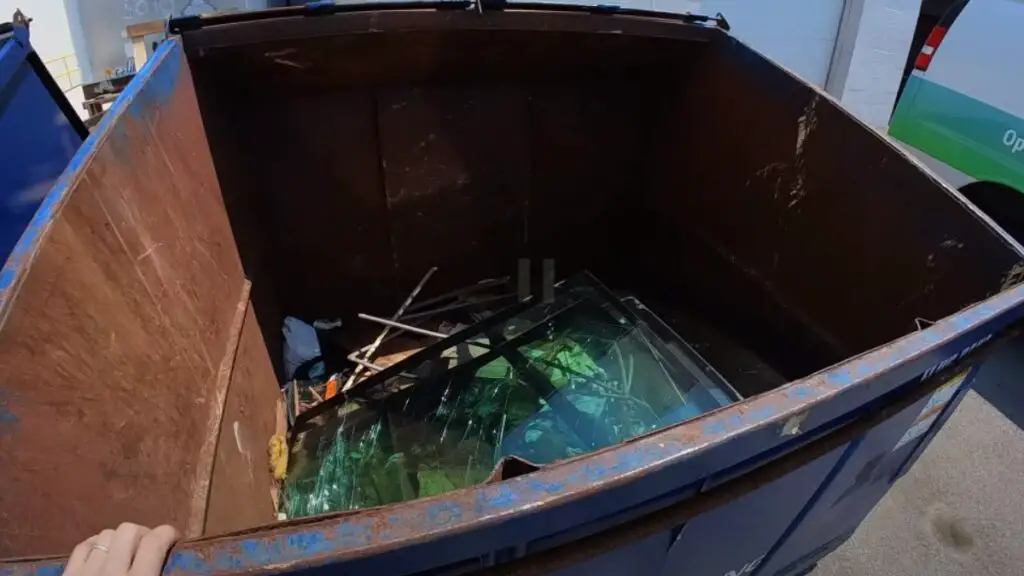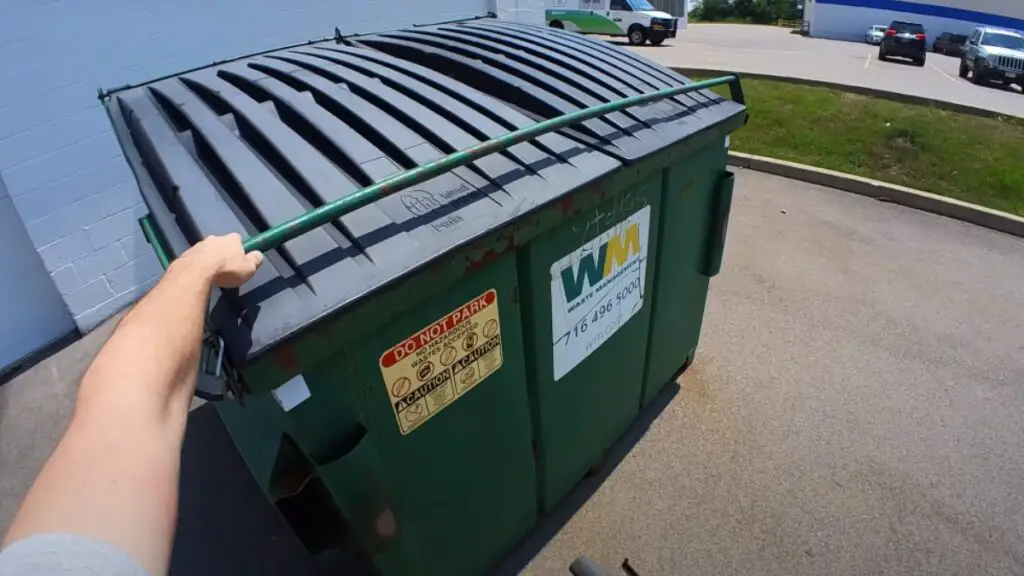Interestingly, Ohio has over 11 million residents, and if only 1% of them engage in dumpster diving, that’s a whopping 110,000 people.
However, a question comes to mind whether dumpster diving is legal in Ohio, what are the state laws, and earning potential.
In this article we will explore these questions and the state laws for dumpster diving, and how much you can make.
Let’s begin!
Dumpster Diving in Ohio

Dumpster diving in Ohio presents a unique set of opportunities and challenges.
Columbus, Ohio, yields considerable finds due to the high concentration of retail outlets; with its bustling shopping centers like Easton Town Center and Polaris Fashion Place.
It’s estimated that each year, retailers in Columbus contribute approximately 20% to the overall dumpster dive yield.
Cleveland, on the other hand, is a hot spot for divers due to the abundant urban residential areas.
More than 15% of dumpster diving yields are reportedly from residential waste in Cleveland.
Cincinnati, with its thriving restaurant scene, is a goldmine for food divers, contributing around 18% to the food recovered from dumpsters statewide.
Meanwhile, Dayton is known for its diverse array of universities, and at the end of each semester, student move-outs contribute significantly to dumpster yields.
In terms of spots, suburban areas, especially around large apartment complexes or dormitories, are often fruitful hunting grounds for dumpster divers.
Is Dumpster Diving Illegal in Ohio
In Ohio, the legality of dumpster diving can be somewhat complicated. Under Ohio Revised Code §2913.04, dumpster diving could potentially be considered illegal as it may fall under “Unauthorized Use of Property.”
This law states that one cannot use another’s property without consent. However, the interpretation highly depends on the local jurisdiction’s discretion and ordinances.
For instance, Cleveland, under Section 605.14, outlines that no person shall remove any rubbish or waste material from premises other than their own.
However, no specific statewide law outright bans dumpster diving.
So, while dumpsters may be in public places, they are often privately owned; therefore, diving could be considered trespassing or theft.
So, you should check with local law enforcement or legal counsel before engaging in such activities.
Is Dumpster Diving at night illegal in Ohio?
In Ohio, dumpster diving, or the act of scavenging through refuse at night, isn’t explicitly declared illegal statewide.
However, you should note that each city or county may have its own regulations.
For example, the city of Cincinnati stipulates that once a person’s garbage is placed on the curb for pickup, it’s considered city property (Cincinnati Municipal Code § 729-1-F).
Hence, dumpster diving can potentially be viewed as theft. Furthermore, if the containers are located on private property, diving into them could be considered trespassing.
Best Places to Dumpster Dive in Ohio
Ohio offers you a variety of locations that are perfect for dumpster diving, which can actually yield valuable finds.
Here are some notable spots:
Columbus, as the state capital and largest city in Ohio, offers a plethora of dumpsters behind retailers and residential areas.
The Short North arts district is notable for its many galleries and boutiques which occasionally discard lightly damaged items.
Cleveland, particularly areas around Case Western Reserve University, can yield excellent finds, especially at the end of the semester when students are clearing out their dorms.
Cincinnati is known for its expansive thrift store culture, and dumpsters behind these stores can often contain items that didn’t make it to the shop floor.
Dayton, a smaller city in Ohio, has an abundance of manufacturing industries. The dumpsters behind these industries occasionally contain scraps that could be reused or sold.
So, if you are planning to dumpster dive at Kansas, Arkansas, or Washington; you should check these state laws before going to your hunt.
How Much Money You Can Make with Dumpster Diving?
So, the earnings can vary greatly depending on several factors; like dedicated time, experience, and your location.
Some dedicated divers have reported making up to $300 a week, which equates to roughly $15,600 annually.
This is based on the resale value of goods collected, including furniture, electronics, clothing, and other items in good condition.
However, these figures are top-tier earnings, with the average diver making closer to $50 – $100 per week, or $2,600 – $5,200 annually.
So, you should also note that success in this activity requires a keen eye for value, knowledge of resale markets, and a significant investment in time and effort.
What Should I Pick While Dumpster Diving?
When you are dumpster diving, you should find items of value that have been discarded. Here are some items you should look for:
- Electronics.
- Furniture
- Books and Magazines
- Clothes
- Scrap Metal
- Broken Tools
- Household Goods
- Collectibles
- DVDs, CDs and Vinyl Records
Can You Get in Trouble for Dumpster Diving?
Technically, dumpster diving is not illegal nationwide in the U.S., but local ordinances can impose certain restrictions or prohibitions.
For instance, California v. Greenwood in 1988 established that there is no expectation of privacy for discarded materials, thus making dumpster diving generally permissible.
In New York City, for example, it’s considered theft to take recycling set out on the curb.
According to a 2019 analysis by the Environmental Protection Agency, Americans generated about 292.4 million tons of trash, of which 69 million tons were recycled and 25 million tons were composted.
If done responsibly, dumpster diving could theoretically divert a small portion of that waste.
What’s the best day to dumpster dive?
The best days for dumpster diving are generally mid-week. This is primarily due to the fact that most residential and commercial waste is collected towards the end of the week.
Which resulted in a replenished and diverse assortment of discarded items by Tuesday or Wednesday.
A 2019 survey by Dumpster Dive Data found that 45% of successful dumpster divers pinpointed Wednesday as their most fruitful day.
What are Safety Precautions for Dumpster Diving?
Here are a few safety precautions for dumpster diving:
- Wear Protective Clothing
- Use a Grabbing Tool
- Don’t Dive Alone
- Check Local Regulations
- Avoid Hazardous Waste
- Be Respectful

Frederick Perez is the founder of Scrape Dude. He loves exploring and finding hidden treasures in unexpected places. Frederick has been dumpster diving and gold panning for years, turning his hobby into our website to share his adventures. He’s known for his friendly advice and exciting stories, inspiring others to discover the joy in these unique hobbies. His expertise makes Scrape Dude a trusted and fun place to learn and explore.


